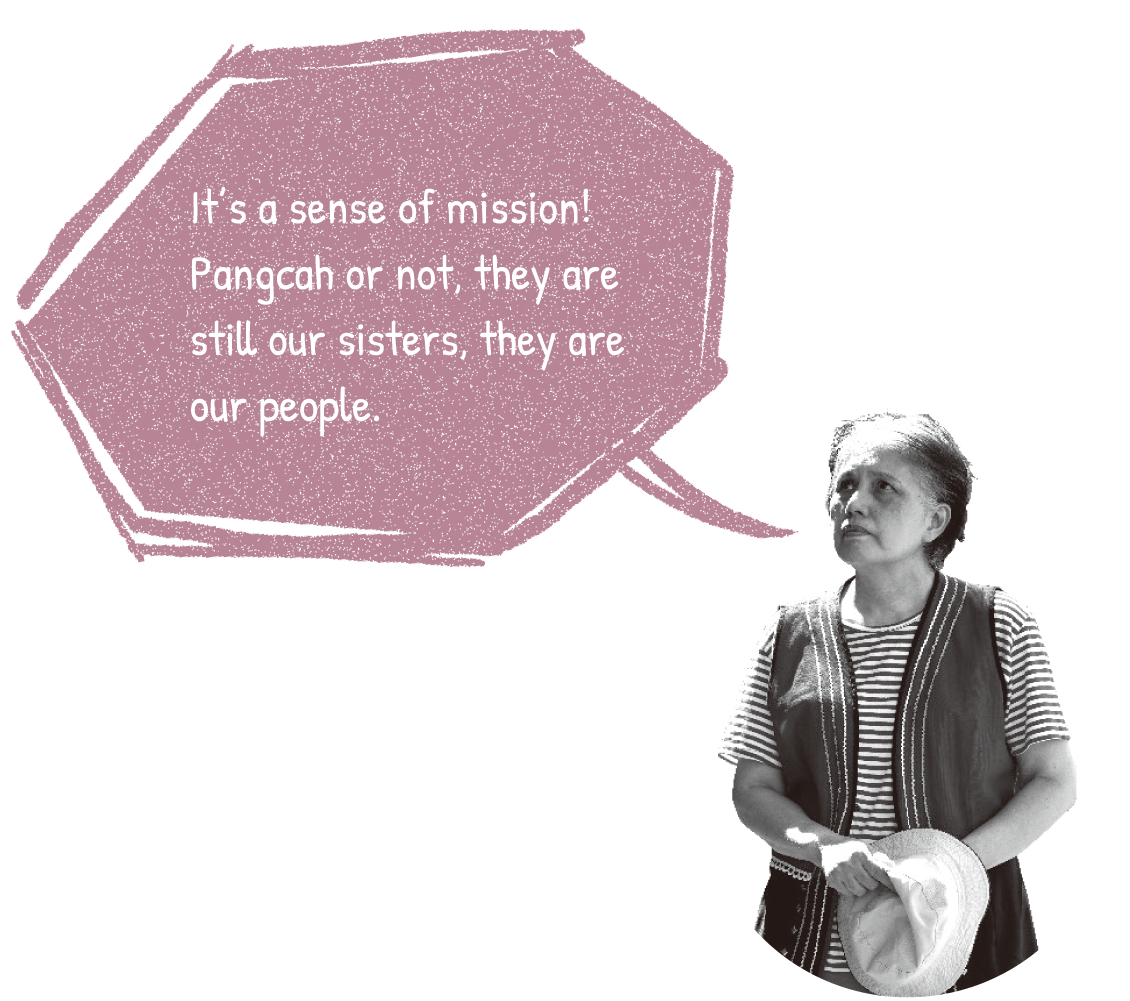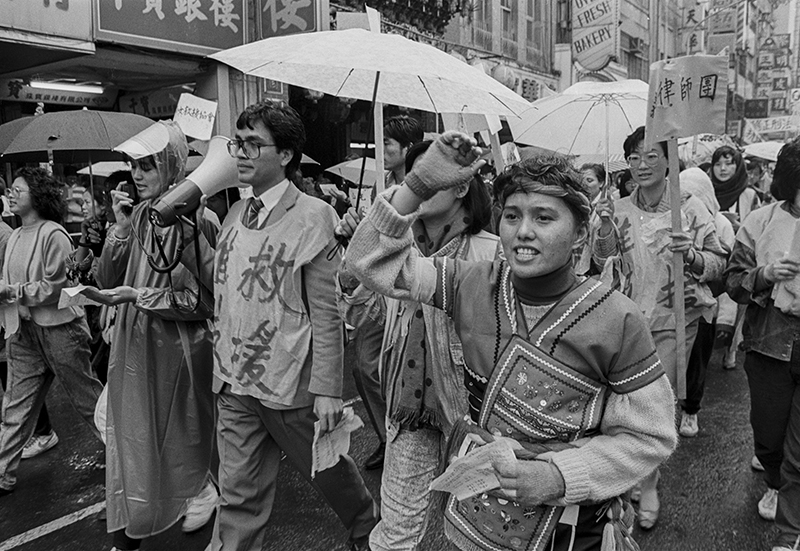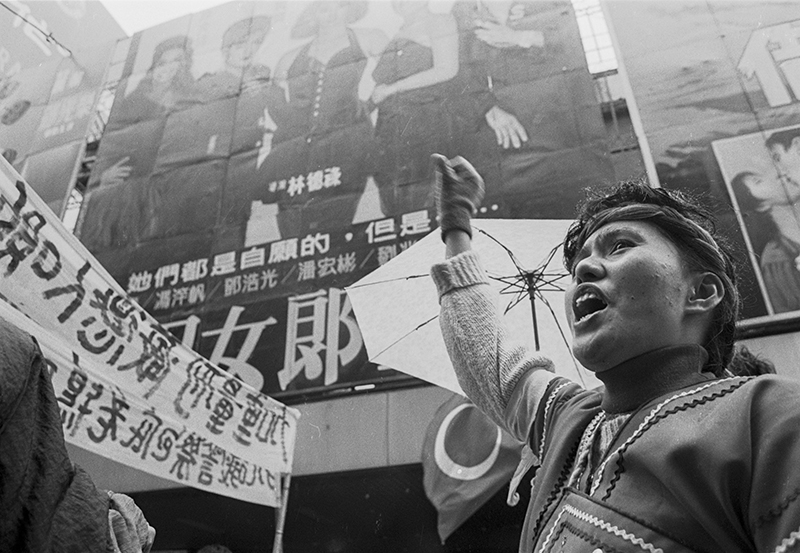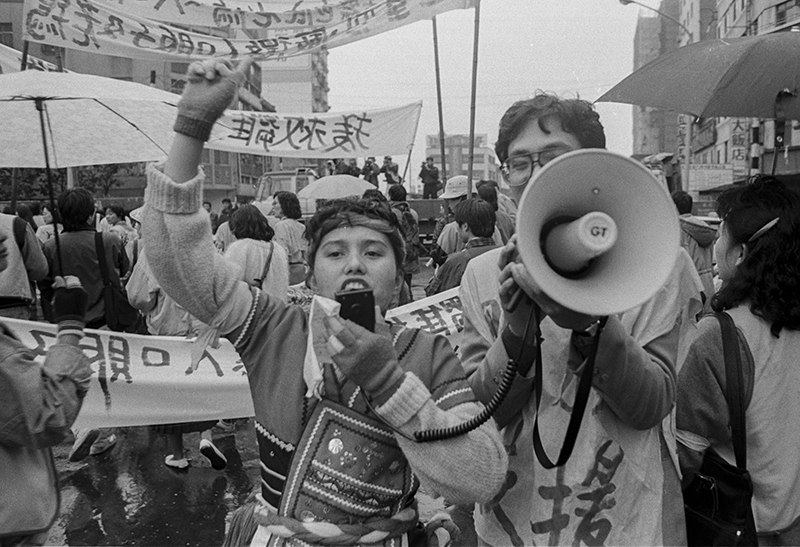

34 years ago, in the significant march against child prostitution in Taiwan, Kawlo Malay called out heartily in Pangcah language to sisters in the dark alleys. After the march, the society confronted the issue of child prostitution and pushed for legal amendment to protect children and youth rights, thus finally ending the tragedy for female youth.
“Say no to selling aboriginal girls!” “Sisters, hear my voice and answer me!” “You must stand for yourselves!” On January 10, 1987, 55 NGOs occupied the Huaxi Street to save children from prostitution in the largest march against child prostitution in the history of Taiwan. Then 29, wearing her traditional Pangcah clothing, standing at the front of the march and calling out with all her might in her mother language using the speaker, Kawlo became the highlight of this historic moment.
In 1980s, Huaxi Street was the infamous Taiwan red light district, known far and wide for its decadence and the girls. Due to economic challenges at home, many indigenous girls under 16 were tricked or sold to this street in Taipei, where it’s always night and never day.
Nothing Wrong with Being Indigenous,
Learn to Reject Inequality
Since a young age, Kawlo had felt deeply the inequality towards indigenous peoples. Born in Hualien, Kawlo moved to Taipei in third grade and started noticing the discriminating looks surrounding her. During a math exam in fifth grade, Kawlo answered correctly but her teacher accused her of copying from the student sitting next to her. Even though that student had the wrong answers, she was still sent out of the classroom to stand in punishment. The unpleasant experiences as a child made her feel inferior to others as an indigenous person.
Entering middle school, Kawlo was elected a class leader, but lacking confidence, she came up with three excuses explaining why she wasn’t suitable for the position. First was that she is an indigenous. The teacher said, indigenous is human like everyone else, that was not good enough a reason. Then she said her grades were not good enough, but the teacher believed that she could work harder to make up for the grades. Finally she said as bottom line that she had tuberculosis growing up and was physically incompetent, her teacher simply said that it was medically treatable. Having her excuses rejected three times by the teacher, Kawlo had no choice but to take up her position as a class leader, “that teacher had a real impact on me, inspiring me to do better and no longer feel inferior as an indigenous person.”
Although she was also discriminated against in high school, Kawlo was slowly awakening as an indigenous person. She needed to work part time as a student to help pay the bills at home, so her homeroom teacher asked her and a group of indigenous students privately to clean the toilets. Kawlo believed that student part time job recruitment should be public and categorically rejected the offer. “That was when I learned to think, make choices, and refuse for myself.”

It's a Sense of Mission!
They are Our People
Kawlo later enrolled at Yu-shan Theological College & Seminary, and upon graduation was assigned to Keelung to start a church there. With $5,000 per month as salary, she couldn’t make ends meet at home. Hence she also worked part-time at the Indigenous Laborer’s Gospel Home in Taipei of the Presbyterian Church in Taiwan, fighting for the rights and benefits of laborers. Ever since then, Kawlo began traveling back and forth between the two cities, devoting herself to social services.
The courses at the Seminary gave her the chance to contemplate issues regarding indigenous peoples. After she began working, she often took part in lectures and events held by the Presbyterian Church, which was her enlightenment to social movement. Back then, news on children from indigenous communities being tricked into child prostitution are often heard. She once visited Huaxi Street for business while in Taipei and heard a woman inside a house speak to a man in the Pangcah language, “you’re wearing glasses!” All of a sudden, Kawlo thought of the news reports, “I can understand what she’s saying, and felt her greet us differently, that was a real wake-up call! The people in there are really our sisters!”
All of her enthusiasm and sense of mission powered up, throwing Kawlo into the movement of saving children from prostitution, “it was a sense of mission! Pangcah or not, they are still our sisters, our people.”

Kawlo Malay at the march against child prostitution in 1987.
Armored in Traditional Clothes,
We are Coming to Your Rescue!
With child prostitution becoming an increasingly serious issue, Director Liao Bi-Ying at Taiwan Rainbow Women’s Ministry Center of Presbyterian Church in Taiwan started the “Project Rainbow” in 1986 with the purpose to save children from prostitution. Kawlo was one of the volunteers at the center.
In the following year, over 30 NGOs gathered at Huaxi Street in a sit-in and march against child prostitution, protesting the government for allowing “human trafficking and indigenous child prostitution.” Even though the National Police Agency of Ministry of the Interior launched a Straightening Project in the same year, there was not much effort from the police in the banning and improving of such situations. In 1988, the groups took to the streets again, launching a large-scale march on “Saving Children from Prostitution Once Again”.
Prior to the march, they discussed whether or not to wear their traditional clothing, in order to attract people’s attention on issues regarding indigenous peoples. Kawlo recalls, “I wanted to highlight the issue, so I went all geared up, but ended up as the only one wearing traditional clothing.” On the day of the march, all brothels on Huaxi Street shut their doors and stayed low. The march moved into the small alleys, put up posters on the windows of the brothels, and threw pens printed with the contact number of Project Rainbow and Taipei Women’s Rescue Foundation into the brothels, calling out, “call this number and we will come to your rescue!”
Around the time of the martial law being lifted, social movement organization was still weak in Taiwan, not to mention women’s group, so demands from women were often marginalized. This large-scale march was the first time child prostitution really caught the attention of the public, women’s organizations were established, becoming an important turning point for female movement development in Taiwan. Rescue operations never ceased since then. Women’s groups started halfway houses to shelter the girls, launched anti-child prostitution movements, and trained volunteers. All the efforts pushed the government to adopt the previous version of Child and Youth Sexual Exploitation Prevention Act in 1995. “Legislative amendment was crucial, putting a stop to the buying and swapping of children in indigenous communities, gradually shaping and changing the ideas and concepts of the society,” says Kawlo.

Times and Places have Changed,
I Still Have Dreams to Achieve
With saving children from prostitution as a start, Kawlo was also seen in Give Back Our Lands Movement, Name Rectification Movement, and protest of indigenous laborers against the policy to allow foreign workers. These experiences let Kawlo to realize that it had always been about “economy”. There is no improving of life if the economy is not improved. A lot of domestic violence cases are caused by economic issues.
Sometime around 2000, Kawlo established the Taipei Indigenous Cleaning Labor Cooperation, matching indigenous women with cleaning projects as a way to help the economically disadvantaged women. Realizing the importance of policy, Kawlo twice took up positions within the government system as designated commissioner at the Council of Indigenous Peoples, and was only relieved of duty last year. She is currently the ethnic commissioner at Indigenous Affairs Commission of Kaohsiung City Government, and the Board of Directors of Kaohsiung Indigenous Women Association.
Here and now, Kawlo still has dreams to achieve. Her nephew suffered a sudden onset of cerebrospinal meningitis in sixth grade, and overnight, he lost the ability to talk or move. She wants to set up a foundation for indigenous children with rare diseases, “I want to achieve this before I leave the world.” To this day, Kawlo still sounds like that girl shouting slogans with all her might 33 years ago, ever so determined.




